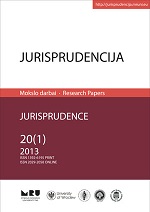Kai kurie baudimo už turto pasisavinimą probleminiai aspektai
Some Problematic Issues of Criminal Liability for Misappropriation
Author(s): Romualdas DrakšasSubject(s): Law, Constitution, Jurisprudence
Published by: Mykolas Romeris University
Keywords: the act of “embezzlement”; fault; formal composition of crime; purpose of the act
Summary/Abstract: The act of “embezzlement” provided for in Article 183 of the Criminal Code of the Republic of Lithuania gives rise to a number of both theoretical and practical problems. First of all, various authors do not agree whether embezzlement constitutes a substantive or formal element. In the author’s opinion, embezzlement is deemed complete when possession of the property of others is taken illegally and there is a real possibility, perceived by the perpetrator, to manage it, to use it or to dispose of it or misappropriation is made of a property right, giving the perpetrator a possibility to receive other persons’ property or property benefit immediately or in the future, to treat the property of others as one’s own. That is, when a real possibility, perceived by the perpetrator, to treat the property of others as one’s own arises but not when the damage is caused. In this case, particular importance is adduced to the condition that the perpetrator must clearly perceive his/her possibility to treat the property of others as one’s own. In case such a possibility has not been perceived by the perpetrator, we cannot state that embezzlement is complete. The moment of completeness and the fact that in practice there may be cases where no real damage is caused to a legal entity when the perpetrator embezzles property of the former (see the example in footnote 15), show that the criminal act provided for in Article 183 of the Criminal Code contains a formal element. When evaluating practical problems, the article overviews two rulings of the Supreme Court of Lithuania that are of particular importance for the formation of the case-law. Before the ruling of the Supreme Court of Lithuania of 8 May 2012, this court used to formulate somewhat erroneous case-law in examining cases concerning accusations raised on the basis of Article 183 of the Criminal Code. In cases where the head (shareholder) of a company was accused of embezzlement and used all the “cashed” funds of the company only for the interests and benefit of the company, the court used to evaluate the factual circumstances of the case not as indicative of the fault of the defendant, but only as indicative of the purpose of his/her act. Even if it was determined that the perpetrator did not perceive the real possibility to treat the company’s property as his/her own and always used to regard the property which came to his/her disposal as the company’s property, the court used to qualify the perpetrator’s act as embezzlement, by reasoning that the purpose of the perpetrator’s act was not a circumstance relevant for such qualification. It can be stated that in such a manner the court failed to distinguish between the concept of purpose and the concept of fault, failed to evaluate the features of the subjective part individually, and assessed them in their entirety. Due to such a mistake, the court created an impression that the concepts of fault and purpose in the case were confused. By its ruling of
Journal: Jurisprudencija
- Issue Year: 20/2013
- Issue No: 1
- Page Range: 283-299
- Page Count: 17
- Language: Lithuanian

